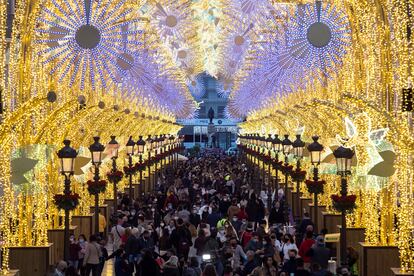Why Christmas in Spain won’t be ‘saved’ this year
Both regional governments and the central administration support keeping coronavirus restrictions in place, but health experts warn these may not be enough to prevent a new spike in cases in January

The obsession with “saving Christmas” in Spain appears to have ended. That is, if saving Christmas means dinners with lots of guests, opening up the hostelry sector without restrictions or lifting most of the coronavirus measures currently in place.
The central and regional governments have a similar strategy to curb contagions over the holiday season, albeit with some minor differences such as whether gatherings should be limited to 10 or six people, if this number should take into account children, and if the nighttime curfew for Christmas Eve and New Year’s Eve should start at 1am or 1.30am.
Despite these minor differences, both levels of government are working hard to ensure that Spain does not see a repeat of what happened in summer, when the virus started to spread again and sparked a second wave that is only now starting to subside. Both authorities and epidemiologists agree that there is a high risk that there will be more coronavirus outbreaks or even a third wave after the holiday season. Despite this, few are proposing more restrictive measures, such as a total lockdown that would stop families from seeing one another over Christmas. What direction the epidemiological curve takes depends, in large part, on how citizens behave and what safety measures are taken during the festive gatherings.
It is impossible to ensure the measures are followed because no one is going to check what is happening in each homeJesús Molina Cabrillana, of the Spanish Society of Preventive Medicine
Most experts who spoke to EL PAÍS agree that more than the details of each restriction, what’s important is sending a clear message: this Christmas will be different and much of what has been enjoyed in previous years will have to be foregone this year. It is not a question of whether six or 10 people should be seated at a table, but rather if they come from different households and what measures are taken before, during and after family meals.
The idea to economically save Spain’s summer season not only had a negative impact on public health, it also hurt the Spanish economy, leading to the introduction of more coronavirus restrictions for a longer period of time. For this reason, Raymond Torres, the head of international analysis at the think tank Funcas, recommends keeping the current measures in place until at least the end of the year until the contagion rate falls to “reasonable levels.” “I am sure that this will negatively impact the economy, but much less so than reopening too soon which will inevitably lead to a shutdown in January, with much more harmful consequences on consumption, mobility and activity,” he says. From a strictly economic point of view, Torres believes that regional governments should also continue to seal their borders.
The situation Spain is in as it heads into Christmas is much more critical than the one it was in before summer. On June 21, the 14-day cumulative number of coronavirus cases per 100,000 inhabitants was just eight. Last Friday, that figure was 307. If the epidemiological curve rose slowly over the summer, a poorly managed Christmas could lead to a sharp uptick in cases in just a few days. Regardless of how much the incidence rate falls between now and the last week of December, the level is not expected to drop below what European and health authorities consider “high risk” or “extreme.”

Alberto Infante, an emeritus professor at the Carlos III Health Institute in Madrid, explains: “In Spain, both the government and the regions decided on a strategy to gently reduce [coronavirus cases], avoiding a total but relatively short total lockdown, and applying restrictions for a longer period. This has a hypothetical advantage: it may affect the economy less, something which remains to be seen. But it has a definite cost: a very high number of fatalities [November has seen the second-highest number of victims after April]; and another likely cost: a greater risk of outbreaks because we are moving along such high levels.”
The risk is there but nobody knows with any certainty what the cost of taking it will be. At his last government press conference on Thursday, Fernando Simón, the director of the Health Ministry’s Coordination Center for Health Alerts (CCAES), warned the holiday season would have “some impact” on the curve of infections. “Let’s see how we behave. We hope it will be as minor as possible,” he said. Speaking to Socialist Party (PSOE) supporters on Saturday, Spanish Prime Minister Pedro Sánchez argued: “This Christmas, health precautions must be prioritized over any other resolution. Let’s give security to those we love.”
Sánchez underscored that the next six months will be decisive. “We will witness a critical stage of the pandemic coinciding with the first large-scale vaccinations,” he said, in reference to the government’s coronavirus vaccine drive.
Other European countries are also taking certain risks over the festive season, be that allowing gatherings that are normally banned, pushing back curfew hours or permitting travel so that family members can see one another. This is despite the fact that the European Center for Disease Prevention and Control (ECDC) has warned against relaxing coronavirus restrictions. In a report published last week, the ECDC said that if the current measures in place are lifted on December 21, the third wave of the pandemic would quickly overwhelm the health system again.
Measures like limiting the number of people at gatherings, although painful, are right, necessary and effectiveSaúl Ares, biologist at the National Research Council
In Spain, the Inter-Territorial Council of the National Health System, which brings together central and regional health chiefs, is working on an agreement for Christmas restrictions based on recommendations from the Health Ministry. In a draft document, which was leaked last week, the ministry proposed a range of measures, most importantly, limiting gatherings to six people, and setting a 1am curfew on Christmas Eve and New Year’s Eve. Health Minister Salvador Illa said that he hoped the council would reach an agreement on the common recommendations – which can be adapted according to the situation in each region – at its next meeting on Wednesday.
The Madrid region is pushing for the most flexible rules, with a curfew at 1.30am and a 10-person limit on gatherings, but the rest of Spain’s 17 regions largely agree with the measures. Many regions also have closed off their borders and it will be up to them to decide whether to keep this measure in place or to reopen – either for the holiday season or on set days – to allow residents who are outside of the region to return home. Authorities in Andalusia are considering a protocol for residents who are outside of the southern region, while in Valencia, the government is planning to only open the regional border on the most important days of the festive season.
According to Óscar Zurriaga, the vice-president of the Spanish Epidemiology Society, the regions are not so much trying to save the economy as the “emotional role” of the Christmas holidays. “We have gone through too hard a year to accept that we can’t get together at Christmas; many people only see each other at that time. But it will lead to gatherings in closed spaces, between people who are not members of the same household and with little likelihood of safety measures being respected,” he says, warning that Spain will “likely” see a new rise in cases as happened following the summer holidays and the start of the university year. In his opinion, it is “wrong” to focus on whether children should be counted or not in the limits on gathering. “The problem is not the number, but rather the risk,” says Zurriaga. “Perhaps instead of dinners in enclosed spots, we should try to have meals in open spaces.”
Jesús Molina Cabrillana, from the Spanish Society of Preventive Medicine, is also skeptical about the effectiveness of concrete measures. “I suppose they will be a deterrent, but it is impossible to ensure they are followed because no one is going to check what is happening in each home,” he says. “The message should be that this Christmas has to be different, that celebrations have to take place between members of the same household and that you can’t change groups because transmission is going to rise.”
Saúl Ares, a researcher from the National Center of Biology at the National Research Council (CSIC), is more optimistic about coronavirus restrictions, arguing they “will be key to avoiding recklessness that could lead to a grim January.” “I believe measures like limiting the number of people at gatherings, although painful, are right, necessary and effective. I also think curfews on set dates are a good idea, more for their psychological and deterrent effect than the measure itself. It will be very important to have a cohesive information and awareness campaign from the administration. Saving Christmas is spending the holiday without getting infected or infecting our loved ones,” he adds.
According to Ana María García, a professor of public health at Valencia University, a third wave is “inevitable” or at least “very likely.” “Beyond what this or that person says and what is and is not allowed in your region, what we can say is this: the less [travel, fewer gatherings, smaller size of gatherings], the better. Despite this, all [epidemiologists] believe that there will be another spike after Christmas.” But she does point to one advantage with respect to summer: “People have learned a lesson and will be more careful.”
Ildefonso Hernández, the spokesperson of the Spanish Public Health Association, believes that the likelihood of a third wave all depends on whether “people take seriously” the message that this Christmas season has to be different. “The population has thrown up surprises. In Madrid, it was the public’s behavior that lowered the incidence rate before measures were introduced. There is a sociological dynamic that sometimes responds on its own and could give us a pleasant surprise.”
English version by Melissa Kitson.
Tu suscripción se está usando en otro dispositivo
¿Quieres añadir otro usuario a tu suscripción?
Si continúas leyendo en este dispositivo, no se podrá leer en el otro.
FlechaTu suscripción se está usando en otro dispositivo y solo puedes acceder a EL PAÍS desde un dispositivo a la vez.
Si quieres compartir tu cuenta, cambia tu suscripción a la modalidad Premium, así podrás añadir otro usuario. Cada uno accederá con su propia cuenta de email, lo que os permitirá personalizar vuestra experiencia en EL PAÍS.
¿Tienes una suscripción de empresa? Accede aquí para contratar más cuentas.
En el caso de no saber quién está usando tu cuenta, te recomendamos cambiar tu contraseña aquí.
Si decides continuar compartiendo tu cuenta, este mensaje se mostrará en tu dispositivo y en el de la otra persona que está usando tu cuenta de forma indefinida, afectando a tu experiencia de lectura. Puedes consultar aquí los términos y condiciones de la suscripción digital.









































